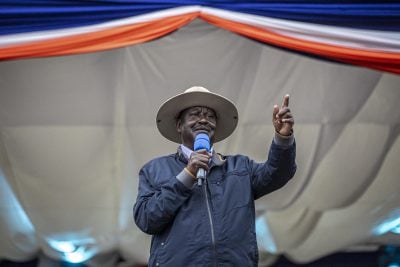This article was produced with the support of Olam
African Business: What are the main challenges and opportunities Olam Agri sees in the industry over the next few years?
Julie Greene: Today’s global food and agricultural landscape is shaped by six major challenges. Olam Agri recognises the importance of addressing these challenges in meeting the world’s growing demand for food, feed and fibre, while fulfilling the world’s evolving food security and sustainability needs.
Meeting the growing demand for food. The world population is set to surpass 8bn and remains on track to grow by more than 2bn by 2050. The growing global population will have a multiplier impact on food, feed and raw material. This highlights the challenge for the agriculture industry: to provide access to food and nutrition for all, and to do it responsibly and sustainably.
How does Olam Agri plan to stay competitive in a rapidly changing business environment? How does Olam Agri plan to navigate challenges and capitalise on opportunities in the global market?
The agriculture industry has experienced the impacts of global supply chain disruptions and increased volatility, and this has created knock-on effects on food security for countries. These events have underscored the importance of building a business that is resilient and responsive to such changes.
Olam Agri has built up a global origination footprint, as well as advanced operating and risk management capabilities, which enable us to remain competitive in a rapidly changing business environment.
Additionally, our comprehensive understanding of food and agricultural market needs, built over more than three decades, sets us apart from our peers. We have the advantage of a differentiated asset-light model that offers not only cost efficiency but allows us to be highly adaptable to changes in our business environment. As an independent trader, we can trade with both local players and global majors in origin and destination markets, offering us a cost advantage and increased agility to respond to shifting trade flows.
This clear focus on building a presence across emerging markets, particularly in Asia and Africa, alongside an extensive global network of smallholder farmers and farming communities, positions us to capitalise on opportunities in the global market.
How is Olam Agri addressing sustainability concerns in its operations and supply chain?
To make agriculture more sustainable requires a transformative approach that reflects the interconnectedness of our climate, natural environment and people. We’re leading the transition to support more people, produce more effectively, and farm more responsibly with a strategy that aims to make an impact in three key areas: decarbonisation, soil health and farmers’ livelihoods:
1 .Decarbonisation To achieve our goals, we have completed a comprehensive review of our entire operation, including supply chains, to better understand our carbon footprint across Scopes 1, 2 and 3, as well as which geographies this footprint comes from. We have identified and implemented key carbon reduction and removal initiatives that will allow us to reduce our footprint and achieve our Net Zero target by 2050.
2. Soil health Soil is the foundation of all agriculture. Any impacts on soil health will impact crop yields and food security. Today, while the majority of the world’s remaining unused, arable land is in Sub-Saharan Africa, soil degradation threatens 65% of the region’s land. Our focus on soil health involves supporting the ecosystems that our crops, climate, water, biodiversity, and livelihoods rely on. Our six core principles for healthy soil include training farmers to minimise tillage and improve the nutrients and microbial diversity of soil.
We are working with farmers in our supply chains to support access to training, technology and financing for regenerative practices. 100% of our cotton sourced from Côte d’Ivoire is certified by regenagri, an international regenerative agriculture programme for securing the health of the land and the wealth of those who live on it.
3. Income Our sustainability programmes aim to enhance the livelihoods of farmers and improve living conditions in the rural communities where many of them live. Access to knowledge, skills, inputs, and tools are vital ingredients for success, contributing to improved incomes and better livelihoods. In 2022, we supported nearly 400,000 smallholder farmers through our livelihood programmes.
In places where we operate, we aim to contribute to the development of local skills and capabilities by investing in value added operations. We work with close to 290,000 cotton farmers in West Africa, which includes an integrated ginning model that has created 1,000 more jobs. In Congo, we invest in best-in-class wood processing technologies to make semi-finished and finished products, while improving local skills and production capabilities.
Can you provide examples of specific sustainability initiatives or achievements from the past year?
Our team in Nigeria was recognised with the Sustainability Initiative of the Year at the African Food Awards 2023 for our Seeds for the Future (SFTF) initiative. It was introduced in 2021 as a wheat value-chain social sustainability investment vehicle in Nigeria.
It is propelled by five key pillars: supporting farmers and farming communities; enabling broader education and skill development for youths; empowering female farmers and bakers; promoting health and nutrition; and decarbonising business operations.
In 2022, the initiative yielded strong first-year results of its multi-year research, seed trial and multiplication effort, promising a future of increased local wheat production for Nigeria. This recognition of Seeds for the Future underscores our commitment to social and economic empowerment alongside ensuring food security through a staple crop like wheat. As we continue investing in Nigeria’s food and agriculture development, this initiative has evolved into a full-fledged foundation, expanding our impact amongst farming communities and in areas such as consumer health and environmental sustainability.
How does Olam Agri integrate environmental, social, and governance (ESG) factors into its decision-making processes?
At an organisational level, we embed sustainability into our strategic direction and decisions at the highest levels through our Board. Our Board’s Corporate Responsibility and Sustainability Committee Oversees environmental, social and governance-related issues including climate risks and our ESG integration strategy.
In addition, we recognise the importance of a triple bottom line that addresses not only our economic performance, but environmental and social impact as well. We have adopted an innovative approach of multi-capital valuation and accounting, which allows us to embed natural, social, and human capital impacts and dependencies into our business strategy and decision-making processes. Quantifying the value of our environmental and social impacts in monetary terms helps us communicate our sustainability performance with both internal and external stakeholders in a common business language.
We focus especially on natural, social and human capital, which includes considerations such as our use of natural resources like water and land, or human resource practices. We then integrate natural, social and human capital, translating the data into three elements: Profit and Loss; Balance Sheet; and the Risk and Opportunity Statement. While these are not assessed in traditional accounting and reporting frameworks, accounting for non-financial capital allows us to make decisions that ultimately help us build a more resilient business.
What will your chief message be at Davos Klosters and what do you hope to take from the WEF event?
Our focus will be to emphasise the need for increased public-private partnerships to decarbonise our food supply chains and promote the widespread adoption of regenerative agriculture among farmers. We also aspire to highlight projects that require funding, ensuring that resources are directed towards helping large and smallholder farmers transition towards adopting regenerative agricultural practices, particularly in Africa and Asia where they are situated.
The World Economic Forum at Davos-Klosters provides a unique platform for fostering these collaborations and we look forward to engaging in discussions that contribute to shaping a more sustainable food value chain.
As we look ahead to the WEF event at Davos-Klosters, our mission is to meet the growing demands for food without compromising the health of the planet, and we believe that collaborative efforts are key to achieving this goal.
 Sign in with Google
Sign in with Google 



